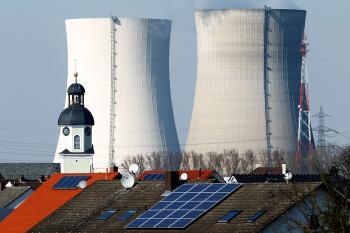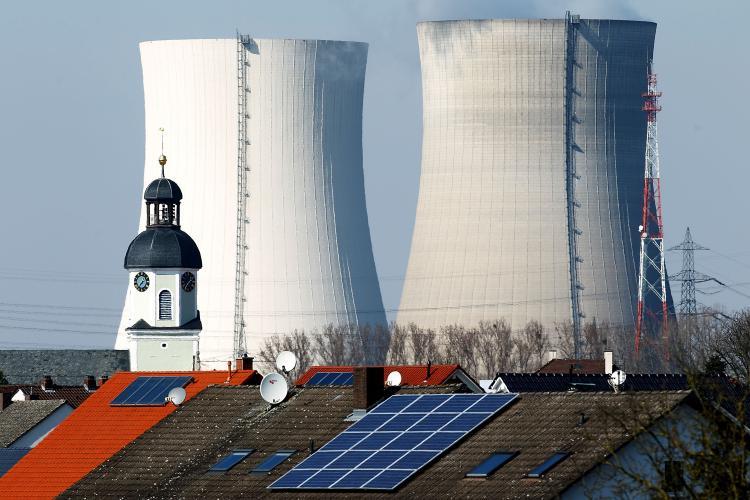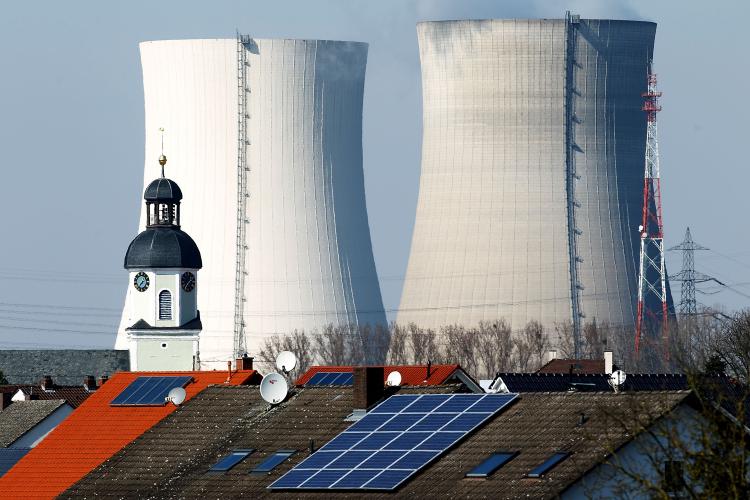MUNICH—In the midst of the Japanese nuclear disaster in Fukushima, Germany became one of the first countries to strongly consider the move from nuclear to renewable energies domestically.
German Chancellor Angela Merkel has issued orders to close seven of its old nuclear power plants that have been operating since 1980.
“When, in Japan, the apparently impossible becomes possible, then the situation changes. … The nuclear law provides precisely for this: shutting down a plant temporarily until the authorities have achieved clarity about a new situation,” Angela Merkel told reporters in Germany. These seven plants will undergo safety checks for the next three months and most likely will be permanently shut down in the near future.
Besides these seven older plants, Germany has another 10 nuclear plants that in total generate 23 percent of the country’s electricity supply.
Last week, Chancellor Merkel suspended a decision taken last fall to prolong the working life of all of its nuclear plants beyond 2021. She sees nuclear energy as a bridging technology to temporarily provide electricity until renewables are 100 percent ready to replace nuclear.
“We will use the moratorium period [until 2021], which we deliberately set to be short and ambitious, to drive the change in energy policy and accelerate it wherever possible, as we want to reach the age of renewable energy as quickly as possible,” she said.
According to German Renewable Energy Federation (BEE), at the moment Germany’s renewable energy sector comprises 17.4 percent of the total generated electricity in the country. Out of the renewable energy mix in Germany, wind power leads the pack with 38 percent, followed by hydroelectric power at 20 percent, then biogas at 15 percent, biomass at 12 percent, and 7 percent from photovoltaic among others. By 2020, renewables are estimated to generate around 47 percent of Germany’s power supply.
“Renewables could be ready to provide 47 percent of German power supply up to 2020. This way they would not just compensate for the nuclear withdrawal (meant to happen by 2021 at the latest), but in addition offer affordable and sustainable power,” said a spokesman from German BEE.
As a comparison, in the United States nuclear power comprises only 8 percent and renewable energy is 7 percent. The vast majority—a whopping 86 percent—comes from fossil fuels. Interestingly, fossil fuel-dominated energy is much cheaper, as Americans pay on average 9.28 cents per kilowatt-hour per household. A German household pays three times more than Americans—30.66 cents per kilowatt-hour. A Japanese household pays on average 20 cents per kilowatt-hour. In Japan, 15 percent of electricity comes from nuclear power, about 80 percent from fossil fuels, and only 5 percent from renewable energy sources.
As a result of the recent scrutiny on the nuclear sector in Japan, solar companies have experienced a pleasant upward climb in their stocks.
One of the biggest beneficiaries in Europe—Solarworld AG—a leading German photovoltaic company and third biggest in the world, has seen its stock soar by more than 30 percent after Angela Merkel’s decision to close seven of the country’s older nuclear power plants.
German Chancellor Angela Merkel has issued orders to close seven of its old nuclear power plants that have been operating since 1980.
“When, in Japan, the apparently impossible becomes possible, then the situation changes. … The nuclear law provides precisely for this: shutting down a plant temporarily until the authorities have achieved clarity about a new situation,” Angela Merkel told reporters in Germany. These seven plants will undergo safety checks for the next three months and most likely will be permanently shut down in the near future.
Besides these seven older plants, Germany has another 10 nuclear plants that in total generate 23 percent of the country’s electricity supply.
Last week, Chancellor Merkel suspended a decision taken last fall to prolong the working life of all of its nuclear plants beyond 2021. She sees nuclear energy as a bridging technology to temporarily provide electricity until renewables are 100 percent ready to replace nuclear.
“We will use the moratorium period [until 2021], which we deliberately set to be short and ambitious, to drive the change in energy policy and accelerate it wherever possible, as we want to reach the age of renewable energy as quickly as possible,” she said.
According to German Renewable Energy Federation (BEE), at the moment Germany’s renewable energy sector comprises 17.4 percent of the total generated electricity in the country. Out of the renewable energy mix in Germany, wind power leads the pack with 38 percent, followed by hydroelectric power at 20 percent, then biogas at 15 percent, biomass at 12 percent, and 7 percent from photovoltaic among others. By 2020, renewables are estimated to generate around 47 percent of Germany’s power supply.
“Renewables could be ready to provide 47 percent of German power supply up to 2020. This way they would not just compensate for the nuclear withdrawal (meant to happen by 2021 at the latest), but in addition offer affordable and sustainable power,” said a spokesman from German BEE.
As a comparison, in the United States nuclear power comprises only 8 percent and renewable energy is 7 percent. The vast majority—a whopping 86 percent—comes from fossil fuels. Interestingly, fossil fuel-dominated energy is much cheaper, as Americans pay on average 9.28 cents per kilowatt-hour per household. A German household pays three times more than Americans—30.66 cents per kilowatt-hour. A Japanese household pays on average 20 cents per kilowatt-hour. In Japan, 15 percent of electricity comes from nuclear power, about 80 percent from fossil fuels, and only 5 percent from renewable energy sources.
As a result of the recent scrutiny on the nuclear sector in Japan, solar companies have experienced a pleasant upward climb in their stocks.
One of the biggest beneficiaries in Europe—Solarworld AG—a leading German photovoltaic company and third biggest in the world, has seen its stock soar by more than 30 percent after Angela Merkel’s decision to close seven of the country’s older nuclear power plants.






